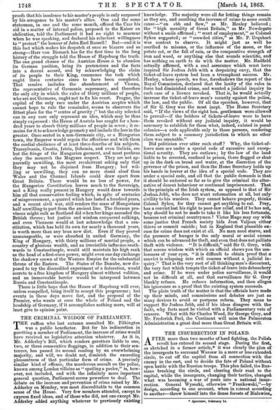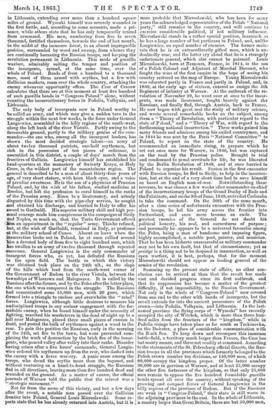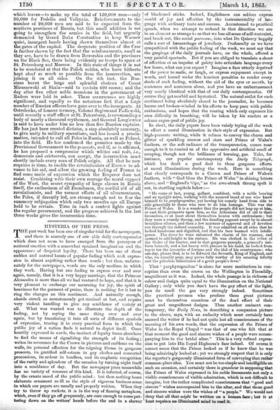THE INSURRECTION IN POLAND.
AFTER more than two months of hard fighting, the Polish revolt has entered its second stage. During the first, as sketched in a former article,* it was clearly the plan of the insurgents to surround Warsaw in a more or less extended circle, to cut off the capital from all connection with the enemy in the east, and to decide the fate of Poland without open battle with the Russian troops. This plan failed, the Rus- sians breaking the circle, and clearing their road to the capital, while the insurgents, changing their tactics, changed what was becoming a war of posts into a national insur- rection. General Wysozki, otherwise " Frankowski,"—by design, according to one account, when in retreat according to another—threw himself into the dense forests of Bialowice„ • Spectator, February 14.
in Lithuania, extending over more than a hundred square miles of ground. Wysozki himself was severely wounded in the first battle, and, according to some accounts, made a pri- soner, while others state that he has only temporarily retired from command. His men, numbering from five to seven thousand, fortified themselves, towards the end of last month, in the midst of the immense forest, in an almost impregnable position, surrounded by wood and swamp, from whence they are continually harassing the Russian troops, and keeping the revolution permanent in Lithuania. This mode of guerilla 'warfare, admirably suiting the temper and position of the insurgents, spread, at the same time, over the whole of Poland. Bands of from a hundred to a thousand men, most of them armed with scythes, but a few with Gallician muskets, roam over the whole country, attacking the enemy whenever opportunity offers. The Czas of Cracow calculates that there are at this moment at least five hundred of such guerilla bands in " Congress-Poland " alone, without counting the insurrectionary forces in Podolia, Volhynia, and Lithuania.
The only body of insurgents now in Poland worthy to be called an army, and which may give a sudden turn to the struggle within the next few weeks, is the force under General Langiewicz, assembled in the hilly regions of the south-west, along the left bank of the river Vistula. Partly owing to the favourable ground, partly to the military genius of the com- mander—the one who, among all the insurgent leaders, has shown the most decided strategic talent—an army of about twelve thousand patriots, one-half scythemen, but rich in the possession of ten pieces of ordnance, is assembled in this district, a couple of days' march from the frontiers of Gallicia. Langiewicz himself has established his head-quarters at the monastery of Swienty Krzyz, or Holy Cross, in the wildest part of the mountainous region. The general is described to be a man of about thirty-four years of age, of very short stature, with keen black eyes, and a voice of peculiar sweetness. He is the son of a physician of Prussian -Poland, and, by the wish of his father, studied medicine at Breslau, but left the profession to enrol himself in the ranks of the Prussian army. Risen to a lieutenancy, and utterly disgusted by this time with the pipe-clay service, he sought and obtained his discharge, and hurried to Italy to offer his sword to Garibaldi. His superior military skill and high per- sonal courage made him conspicuous in the campaigns of Sicily Snd Naples, so much so, that the Turin Government offered Afini an appointment in the "regular" army. This he refused, but, at the wish of Garibaldi, remained in Italy, as professor -at the military school of Cuneo. Absent on leave when the insurrection broke out in Poland, he at once rallied around ltim a devoted body of from five to eight hundred men, which has swollen to an army of twelve thousand through repeated successes. General Langiewicz is the only commander of insurgent forces who, as yet, has defeated the Russians in the open field. The battle in which this victory was obtained took place on the 24th ult., on the slope of the hills which lead from the south-west corner of -the Government of Radom to the river Vistula, between the
townships of Wloszowa and Malogoszez. It is called by the Russians after the former, and by the Poles afterthe latter place, the one which was conquered in the struggle. The Russians had concentrated some 15,000 men, with 20 guns, which formed into a triangle to enclose and overwhelm the "rebel" forces. Langiewicz, although little desirous to measure his undisciplined troops in any serious engagement with the for- midable enemy, when he found himself under the necessity of
fighting, marched his musketeers in the dead of night up to a hill near Maloanoszez' placed three small pieces of cannon in
front, and posted the bulk of scythemen against a wood in the Tear. To gain this position the Russians, early in the morning of the 24th, set fire to the town, but were prevented com- pleting the work of destruction by the brisk fire of the insur- gents, who poured volley after volley into their ranks. Disorder laving arisen after a five hours' cannonade, General Langie- wicz ordered his scythemen up from the rear, who dashed into
.-the enemy with a fierce war-cry. A panic arose among the troops, who dread the scythe more than the bayonet, and
without venturing on a hand-to-hand struggle, the Russians fled in all directions, leaving more than five hundred dead and wounded on the ground. Is a matter of course, the official journals of Warsaw told the public that the retreat was a "strategic movement."
Not far from the scene of this victory, and but a few days after the event, a notable man passed over the Gallician
frontier into Poland, General Louis Mieroslawski. Some re- ports state that he has already returned into Austria, but it is more probable that Mieroslawski, who has been for many years the acknowledged representative of the Polish "National party," still remains in the country, and will continue to exercise considerable political, if not military influence. Mieroslawski stands in a rather special position, inasmuch as he has a large number of hot partizans in Poland, and, unlike Langiewicz, an equal number of enemies. The former main- tain that he is an extraordinarily gifted man, which is un- doubtedly true, and the latter cry aloud that he is a strangely unfortunate general, which also cannot be gainsaid. Louis Mieroslawski, born at Nemours, France, in 1814, is the son of a Polish Colonel and Adjutant of Marshal Davoust, who fought the wars of the first empire in the hope of seeing his country restored on the map of Europe. Young Mieroslawski was educated partly in France and partly in Poland, and, in 1830, at the early age of sixteen, entered as ensign the 5th Regiment of infantry at Warsaw. At the outbreak of the re- volution of November 29, he went over at once to the insur- gents, was made lieutenant, fought bravely against the Russians, and finally fled, through Austria, back to France. He now began with great zeal the study of military science, and wrote several remarkable books on the subject, among them a "Theory of Revolution, with particular regard to the state of P3land," and a "Theory of War, with regard to the forthcoming national insurrection." These works gained him many friends and admirers among his exiled countrymen, and in 1844 he was sent by the Paris "National Committee" to Poland, to report on the state of the country. He recommended an immediate rising, to prepare which he set out once more for Warsaw, in 1846, but was captured on the road by the Prussian police. Brought to trial and condemned to penal servitude for life, he was liberated by the Berlin Revolution of 1848, and at once hurried to Poland to organize his revolt. Beaten in the first encounter with Russian troops, he fled to Sicily, to help in the insurrec- tion, but at the end of a very short time had to save himself on board an English man-of-war. Notwithstanding these reverses, he was chosen a few weeks after commander-in-chief of the insurrectionary troops of the Grand Duchy of Bade and the Palati n ate, and on the 9th of June, 1849, arrived at Carlsruhe to take the command. On the 30th of the same month, after a close series of unfortunate encounters with the Prus- sian troops, he led his army across the frontier into Switzerland, and once more became an exile. The greatest enemies of the General do not doubt his political honesty, his zeal, and earnestness of purpose ; and personally he appears to be a universal favourite among the Poles, being a man of handsome and imposing figure, highly accomplished, a notable poet, painter, and musician. That he has been hitherto unsuccessful as military commander may not be his own fault, but that of circumstances; yet as prestige is a thing not to be despised in insurrection, as well as open warfare, it is best, perhaps, that for the moment Mieroslawski should not appear as leading general of the armies of the revolution.
Summing up the present state of affairs, no other con- clusion can be arrived at than that the revolt has made vast and decided progress since its first outbreak, and that its suppression has become a matter of the greatest difficulty, if not impossibility, to the Russian Government.
Not only is the whole of " Congress-Poland " now covered from one end to the other with bands of insurgents, but the revolt extends far into the ancient possessions of the Polish crown—into Podolia, Volhynia, and Lithuania. In the last- named province the flying corps of " Wysozki" has recently occupied the city of Witebsk, which is more than three hun- dred miles from the frontiers of the "kingdom," while in Podolia risings have taken place as far south as Tzekinovka, on the Dniester, a place of considerable communication with the Back Sea. To keep down and reconquer this immense battle-field, a territory much larger than France, the Czar has but scanty means, and these not readily at command. According to the statements of the St. Petersburg official Gazette, the Rus- sian troops in all the provinces which formerly belonged to the Polish crown number ten divisions, or 150,000 men, of which 80,000 occupy the kingdom proper. Of the latter number 30,000 are in garrison at Warsaw, and at least 25,000 occupy the other five fortresses of the kingdom, so that only 25,000 men remain to oppose the five hundred formidable guerilla bands spread all over the country, without speaking of the growing and compact forces of General Langiewicz in the hilly regions of the province of Radom. But if the Russians are weak in "Congress-Poland," their state is still worse in
the adjoining provinces in the east. In the whole of Lithuania, a country larger than Great Britain, there are but 50,000 men, which leaves—to make up the total of 150,000 men—only 20,000 for Podolia and Volhynia. Reinforcements to the number of 20,000 men are said to be expected from thc. southern provinces of Russia, but this small addition is not going to strengthen the armies in the field, but urgently demanded by Grand Duke Constantine to keep Warsaw quiet, insurgent bands having shown themselves almost at the gates of the capital. The desperate position of the Czar is further shown by the fact that the reinforcements, small as they are, have to be drawn from Bessarabia and the provinces on the Black Sea, there being evidently no troops to spare at St. Petersburg and Moscow. In this state of things it is not to be wondered at that the Polish nobles, who have hitherto kept aloof as much as possible from the insurrection, arc joining it on all sides. On the 4th inst. the Rus- sians burnt the large and splendid chateau of Count Miraszewski at Skala—said to contain 400 rooms ; and the day after five other noble mansions in the government of Badotn were laid in ashes. These occurrences are highly significant, and equally BO the notorious fact that a large number of Russian officers have gone over to the insurgents. At Ostrolenka, of famous memory, Colonel Segismund Padlewski, until recently a staff officer at St. Petersburg, is commanding a body of nearly a thousand scythemen, and General Lang:e wicz is said to have under him no less than five Russian captains. Be has just been created dictator, a step absolutely necessary, to give unity to military operations, and has issued a procla- mation, intended to call all Poles in Russia, as well as Poland, into the field. He has confirmed the promises made by the Provisional Government to the peasants, and if, as is affirmed, he has proposed a compromise which whites and reds, i.e., democrats and aristocrats, can accept, the insurrection must shortly include every man ef Polish origin. All that he now requires is time, to enable the revolutionists of Euroee to ad- vance to his aid, and allow the growing feeling of France to find some mode of expression which the Emperor dare not resist. Combining with their own courage the moral support of the West, the secret sympathy of large classes in Russia itself, the enthusiasm of all Frenchmen, the cordial aid of all revolutionists, and the earnest efforts of all ultramontanes, the Poles, if decently led, are strong enough not to fear the summary subjugation which only two months ago all Europe held to be certain. Time in such a contest fights against the regular government, and the progress achieved in the last three weeks gives the insurrection time.
































 Previous page
Previous page